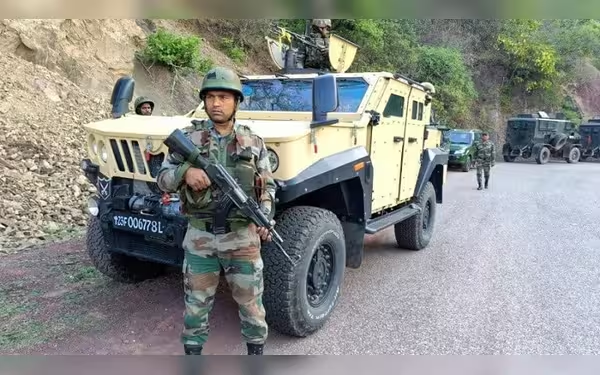Saturday, November 16, 2024 04:55 PM
Pakistan Urges OIC to Address India's Kashmir Actions
- Pakistan highlights Kashmir's plight at OIC meeting.
- India's revocation of Kashmir's status escalates tensions.
- Call for dialogue and resolution in Kashmir crisis.
 Image Credits: tribune_pk
Image Credits: tribune_pkPakistan calls on OIC to address India's oppressive measures in Kashmir, emphasizing the need for dialogue and resolution amid rising tensions.
In recent times, the situation in Indian Illegally Occupied Jammu and Kashmir (IIOJK) has become a focal point of concern for Pakistan and the international community. The region has been a flashpoint of conflict between India and Pakistan for decades, with both nations claiming it as their own. The tensions have escalated, particularly after India revoked the special constitutional status of Kashmir in 2019, a move that has been met with widespread criticism and has intensified the atmosphere of fear and intimidation in the region.
On August 29-30, during a meeting of the Organization of Islamic Cooperation (OIC) Council of Foreign Ministers held in Cameroon, Pakistan’s Foreign Secretary Muhammad Syrus Sajjad Qazi raised these pressing issues. He emphasized the need for the OIC to take a strong stance against India's actions in Kashmir, which he described as oppressive and contrary to United Nations Security Council resolutions. Qazi's remarks highlighted the ongoing struggles faced by the Kashmiri people, who have been subjected to severe restrictions and political detentions.
During the meeting, Qazi also addressed the broader context of regional conflicts, including the ongoing crisis between Israel and Palestine, calling for an immediate ceasefire. His comments were aimed at fostering solidarity among Muslim nations and urging them to take a unified approach towards resolving conflicts that affect their communities.
One of the significant points raised by Qazi was the impact of India's decision to revoke Kashmir's special status. This move has not only heightened tensions between India and Pakistan but has also led to increased militarization and a crackdown on political dissent in the region. Qazi urged India to release all political detainees and to lift restrictions on political activities, which he argued are essential for restoring peace and normalcy in Kashmir.
In response to Qazi's statements, the OIC Contact Group on Kashmir issued a communique that underscored the importance of resolving the Jammu and Kashmir dispute in accordance with UN Security Council resolutions. The group emphasized that long-term peace and stability in South Asia hinge on addressing this longstanding issue.
As India prepares for its first regional elections in Kashmir in a decade, scheduled between September 18 and October 1, the situation remains delicate. These elections will allow Kashmiris to elect their local assembly members, marking a significant shift from direct rule by New Delhi. However, the upcoming elections are viewed with skepticism by many, given the prevailing atmosphere of fear and the restrictions on political freedoms.
The situation in Kashmir is a complex and sensitive issue that requires careful attention from both regional and international stakeholders. The call for dialogue and resolution is more critical than ever, as the people of Kashmir continue to seek their rights and a peaceful existence. The international community, particularly organizations like the OIC, must play a proactive role in advocating for the rights of the Kashmiri people and ensuring that their voices are heard in the quest for lasting peace in the region.













